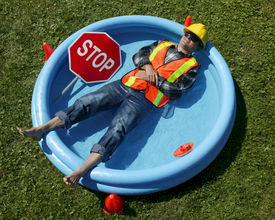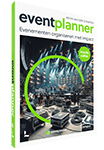Whenever we think about planning an event, we can almost physically feel the heaviness of the tasks ahead and the pressure of the intricate logistics we must deal with. Theyearly statisticsjustify this feeling, showing us how stressful event management is.
Indeed, the multitude of details and the high level of uncertainty make the events industry as compelling and difficult as extinguishing fires. Obviously, we can’t compare ourselves with superheroes that always save the day, yet the amount of stress we must overcome is not much different.
From conceptualizing the entire event to managing the logistics, the life of a planning professional is always defined by interminable to-do lists, unexpected challenges, and loads of caffeine.
This rhythm accelerates every single time we approach a deadline, achieving its peak during the day(s) of the event. And in most cases, we don’t even have time to decompress and rest, because another event may be just around the corner, and instead of taking a few days to rest and restore out energy, we must immediately jump to the next to-do list.
However, this shouldn’t be the case. Being an event professional should mean less logistic-related stress and more creative strategizing.
We should be spending less time on executing and more time on creating memorable experiences for our attendees. Not sure how to make this happen? Here’s a list of steps on how to work less when you plan your next event and put all of your efforts into creative thinking:
Step #1. Digitize the event logistics
By now, you’ve probably already digitized and automated some of parts of the planning, like the online registration and the payment procedure, or the online program. Let’s also add the event website that can be updated easily.
But you can take it one step further.
What you need, to really reduce the time you spend on logistics, is to digitize everything you can. Obviously, in this case, you’ll have to make an investment and go for a complete event management platform that will do the work for you.
Luckily, the market is saturated with digital solutions designed to make your life easier. The only thing you have to do is understand the amplitude of your logistics, identify your needs, and search for the best option.
Once you’ve digitized the entire planning process, you’ll have enough time and energy to focus on the creative aspects of the event you’ve ignored for so long.
Step #2. Diversify your planning team
You can’t be the only one involved in managing the event. You need a team with members who can focus on their specific area. It would be wrong, for example, to have just one person responsible for event marketing, audiovisuals, catering, and analytics. Each requires an incredible amount of time and dedication, not to mention expertise.
A good idea would be to invest in your team and diversify it with niche experts who will focus on their specific planning dimension and achieve impeccable results thanks to their exclusive focus and knowledge.
Step #3. Accomplish more with less
Sometimes, we might get involved in big logistic maneuvers without actually needing them. For example, you may decide to manage each of your attendees’ accommodation logistics one by one, instead of just giving them a list of potential hotels and letting them make their own arrangements.
Things like that happen often when planning an event. Most of the time, you’ll jump into solving a problem without actually realizing that you can overcome the challenge by finding an easier and less-overwhelming solution.
To keep this from happening, before making any big decisions, ask yourself if it’s absolutely necessarily or if there’s a possibility to achieve the same results with less effort.
Step #4. Organize your day wisely
When dealing with event logistics, loads of meetings, and managing teams, it’s almost impossible to focus on the main tasks you need to accomplish. That’s why scheduling your day efficiently is the number one skill you should master.
One way to achieve balance is by organizing your day in batches. For example, you could dedicate your first few hours in the morning to conceptualization, strategy, and creative thinking. Then, you can focus on logistics and answering emails. Later in the day, when you’re a bit tired, you can schedule a series of meetings. This will allow you to work uninterrupted and focus on one task or concept at a time, reducing the feeling of overload.
Step #5. Delegate more to event suppliers
Although we want to have everything under control and find solutions to all of our planning challenges, there are times when we should put faith in others. If you have a logistic dilemma or can’t accomplish a task, think about asking event suppliers for help.
Not sure how to configure the seating? See if the audiovisual company has any ideas to ensure the best visibility for the attendees. Not certain about how to arrange the catering area? You know who to turn to for help. The idea is to struggle less and delegate (meaning trust) more.
Less is more
One of the reasons why you might feel reluctant to do fewer logistic-related tasks is the fear of not dedicating yourself enough to the event. However, you must understand that thanks to the new digital innovations and some of the tactics you can use daily, you’ll be able to free time for a much more valuable work: strategizing and being creative.
Your event won’t lose its quality if you’re not involved in every single detail. On the contrary, you’ll have the necessary time to think about its design and about providing the best experiences for your guests.









